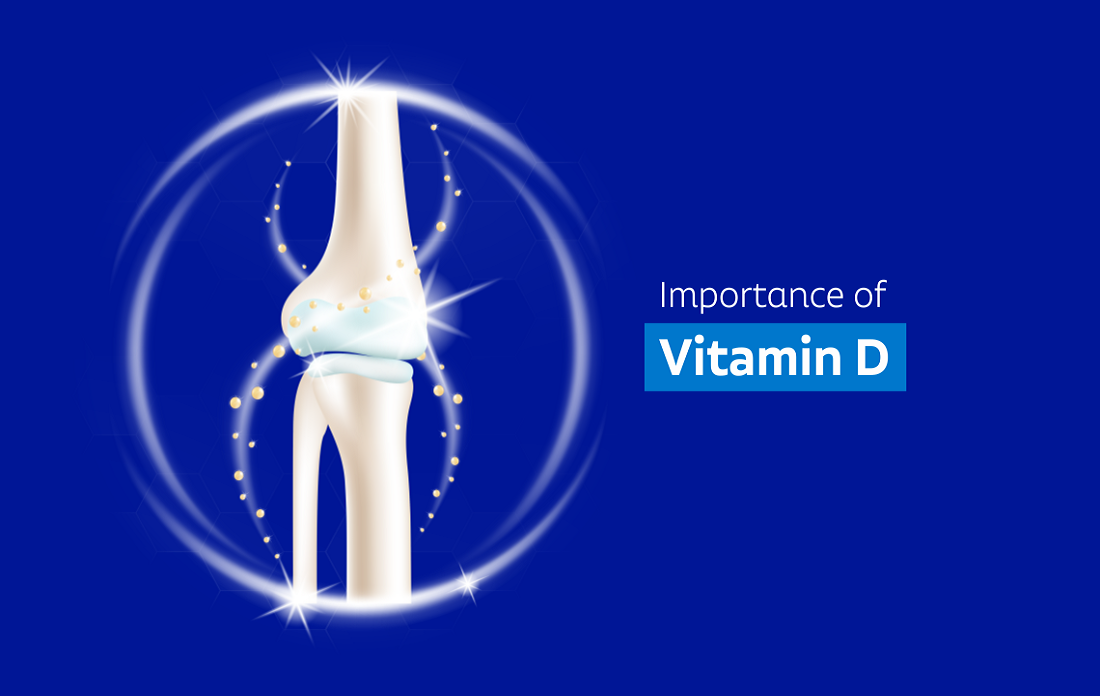|
|

Vitamin D is known as the sunshine vitamin; it is produced by our bodies when we expose ourselves to sunlight. Vitamin D is an important vitamin that has many important roles in the body. It has many benefits and has been linked to a lower risk of developing respiratory infections and the flu, and the risk of developing other chronic diseases such as diabetes and cancer, and even helps maintain our mood.
Vitamin D and Calcium
Vitamin D is often confused with calcium.
It is important to know that Vitamin D is very different from calcium. Vitamin D is actually a hormone, not a vitamin. It is naturally synthesized in our bodies when exposed to sunlight. However, its most important function is to utilize calcium (which is a mineral) to build bone. Calcium and vitamin D work together to guard your bonesócalcium helps build and maintain bones, while vitamin D helps your body effectively absorb calcium.
Benefits of Vitamin D
There are several other benefits to Vitamin D, including
Types of Vitamin D
There are two main forms of Vitamin D- Vitamin D2 (ergocalciferol) and Vitamin D3 (cholecalciferol). They only differ chemically in their side-chain structures. Both types can be obtained from different sources. Vitamin D2 is mainly obtained from plant sources and fortified foods while Vitamin D3 is obtained from animal-sourced foods. Vitamin D3 is produced by the skin when exposed to sunlight and for Vitamin D2, a similar process takes place in plants and mushrooms. Vitamin D3 is generally considered better at improving Vitamin D status as compared to Vitamin D2.
Sources of Vitamin D
So, How do we get vitamin D for our body?
One of the most important sources of Vitamin D is also one of the most overlooked, Sunlight. Our bodies create Vitamin D when our skin detects UV light.
Food Sources of Vitamin D
What is the main use of vitamin D?
Vitamin D has become increasingly important in the last few years. People have started to realize that having enough vitamin D can have a positive effect on health.
But what is the main use of vitamin D? And how can you ensure that you are getting enough?
The main use of vitamin D is to maintain the strength of the bones. When you have enough vitamin D, your bones can cope with everyday stresses. This makes your bones less likely to break under the normal stresses of life. The easiest way to ensure that one is getting enough vitamin D, for Indians, is to make sure that they spend half an hour of time in midday sun two times a week (without sunscreen).
Vitamin D has been proven to guard against
It is also needed for
What are the signs of low vitamin D or Vitamin D Deficiency?
Vitamin D deficiency is a condition that afflicts upwards of 50 percent of the population, though few people know it making most people deficient.
There are several tell-tale signs that you might be suffering from a vitamin D deficiency
Low vitamin D is something that is not well understood. It is incredibly common, but if you ask someone if they are low in vitamin D, they will most often tell you no. Like everything, if deficiency is harmful, so is the excess of it.
Vitamin D is naturally produced when the skin is exposed to sunlight. People who live in areas far from the equator are at risk of not getting enough vitamin D in their diet. However, they are at greater risk of having too much. Vitamin D toxicity can be detrimental to your health. It can cause serious health problems including damage to the kidneys, heart disease, high blood pressure, fatigue, weakness, pain in the bones, muscle weakness, confusion, mood changes, and even paranoia.
Risks of Vitamin D deficiency
1.4 billion people worldwide are deficient in Vitamin D. Not getting enough of the Vitamin D can even lead to many serious health problems like
Treatment
All it takes is a simple blood test to determine if you're deficient in vitamin D, but the test has to be correct and done at the correct time of the year as advised by your healthcare provider.25-hydroxyvitamin D, written as 25(OH)D is the most accurate blood test used to determine Vitamin D deficiency.
The amount of vitamin D that's needed to correct a deficiency will depend upon the severity of the deficiency and your existing medical conditions. The time of year also will impact your needs. The goal for everybody is to urge your levels up to a secure level and stop them from dropping too low with a personally curated maintenance plan.
Vitamin D3 supplements are considered the best choice. These supplements are preferable to be taken with a meal that contains fat.
Vitamin D is a fat-soluble vitamin that aids in the absorption of calcium and phosphate from the gastrointestinal tract. Vitamin D is essential for normal bone development. It regulates the growth of bone cells, as well as the absorption of calcium and phosphorus from the intestine.
Recent Posts